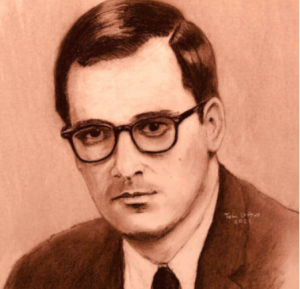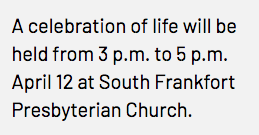By Tom Loftus
The Kentucky Lantern
In simpler days before news was 24/7 online, good newspaper reporters were prone to an affliction that an old Ohio newsman first identified as “loading dock panic.” It struck in the dead of night, with the poor reporter sitting bolt upright and sweaty in bed, consumed with nagging doubt about a story finished and filed for publication hours earlier. Maybe it was uncertainty as benign as the spelling of a name. Or as potentially malignant as a key fact left un-triplechecked.
The afflicted wretch would lunge for the bedside phone to call the night desk. But the clock read 2:15. The papers were already tied and stacked on the loading dock, ready to zip statewide. The story’s fate was sealed.
Later that morning the nervous reporter would tear open the delivered paper and — almost always — see that the story was fine. The panic was pointless. But also part of the job if you were good.

A portrait in charcoal of Richard ‘Dick’ Wilson by Tom Loftus, 2021
Dick Wilson was good.
I knew Dick Wilson, a retired reporter for The Courier-Journal who died Tuesday, for about 40 years, worked closely with him for about 13. And I don’t know for a fact but I’m confident in guessing Dick suffered more than a few loading dock panics. Dick worried deep in his gut about getting the story right.
That’s one reason he was called a legend. That’s why Ferrell Wellman, for years the Frankfort bureau reporter for WAVE-TV, said on learning of his passing that Dick “set the standard for Frankfort reporters for accuracy, fairness, and thoroughness.”
Dick’s lengthy obituary in his old paper rightly emphasized his brilliant coverage of higher education, his scoops like identifying the next president of the University of Kentucky, and an important series he and colleague Richard Whitt wrote in 1983 that helped fuel the movement that eventually reformed Kentucky’s public schools.
The obit also noted that Dick looked the part of a smart reporter — a vaguely professorial visage, complete with horned-rim glasses, Oxford cloth, and pipe (a beloved pipe he put aside after his heart attack and bypass surgery in 1989).
But Dick was more than just smart, he was wise. Wise enough to recognize that the more he learned the more he realized how little he knew. Wise enough to understand, without condescension, that he was probably smarter than his average reader and if he didn’t fully understand something, his reader was sure to have no clue.
So he kept asking questions. Digging. Thinking. Clarifying.
Dick clearly loved the reporting business — the thrill of the chase for a big story, the page one bylines announcing your success, meeting with sources (sometimes clandestinely), swapping war stories over lunch in the Annex cafeteria with the gang from press row (his friendly but cut-throat competition).
He made it look easy. But from my own experience, I can tell you it wasn’t as easy for Dick as he made it seem. The business of finding truth through Frankfort’s haze — the constant self-promoting spin of politicians and the wily manipulation of sources, the shifting “reality” of politics — comes with a fair degree of stress. It’s no wonder old reporters have bad hearts.
Education was his passion and his specialty. Dick was most confident and comfortable covering the university and the schoolhouse. But he also was constantly required to write about topics outside his comfort zone. He covered the legislature — a noisy forum that debated an endless array of complex issues (health care, taxation, pensions, criminal justice, coal mine safety, etc.) infinitely broader than anyone’s comfort zone, even someone as studious as Dick.
As far as I could tell, Dick — like most people who make a living with words — found the process of writing difficult. Dick was not the flashiest, nor the fastest, writer I ever worked with. I attribute that to his obsession with accuracy and fairness. Some writers emphasize style over substance. Dick was all substance. And substance reveals itself slowly in writing.
I asked Stephen Ford, Dick’s editor at the C-J for many years, about this. Steve said Dick “was a little slow to pull the trigger, but he knew what deadlines meant and he met them. He wasn’t a daring writer, but he was clean and clear, and he didn’t mind if an editor jazzed things up a bit if it could be done without changing the story’s thrust or introducing error.”
Dick did not — to put it mildly — adapt easily to the revolution in technology that rocked the newspaper business beginning as far back as 1980, and eventually led to a need for flash and speed that was antithetical to his nature.

You could call him old school and be right. Dick was a reporter who appreciated a really good pen. The joke about Dick was that the only “computer-assisted journalism” he ever did was when he stood on his laptop so he could reach the City Directory off the top shelf of the Bureau bookcase.
But Stephen Ford added, “Dick was ‘old school’ in all of the phrase’s positive senses — indefatigable in collecting information, meticulous and even a bit cautious about how he worded things, unfailingly courteous to everyone he dealt with.”
It was probably good timing for Dick to retire from daily journalism when he did in 1999.
The technology revolution was raging by then. So was the push by the Courier-Journal’s corporate masters to re-invent the very concept of what journalism was every few years, in a desperate struggle to get in front of the technological curve and remain the dominant player in the local news marketplace.
Retirement from daily journalism allowed Dick to indulge another passion — mentoring young journalists.
He worked a year as interim director of the University of Kentucky’s School of Journalism, and then many years of semi-retirement running an internship program that brought college students from across the state to work at and see first-hand state agencies in Frankfort. You would catch sight of him, a little disheveled and breathing hard, professorial and patient, herding his young charges into the Annex basement on their way through the tunnel to the Capitol to see the legislature at work. You’d think: The next generation of Kentucky journalists right there is in damn good hands.
When word came Tuesday that Dick had passed away at age 85 some of us who remember the seriousness of his heart attack in 1989 and visited him in his recent months of ill health, realized how tough Dick was. His was a life that was not only rich and full, but remarkably long. That heart attack 30 years ago didn’t cut him short at all.
Dick’s wife Debbie, and his sons Pete and Geoff, can speak to that great vitality, and to Dick’s most important success in life: His role as husband, father and grandpa.
But journalism was Dick’s profession, and how he’ll be remembered by countless grateful readers and students and colleagues across generations in Kentucky. And the sure-thing bet here is, he found any nights of loading-dock terror a small price to pay for that fine and honorable legacy.
Tom Loftus is a native of Cincinnati. He served four years as Frankfort bureau chief for The Kentucky Post and 32 years as Frankfort bureau chief for the Courier-Journal. He is a membe3r of the Kentucky Journalism Hall of Fame and a freelance reporter for the Kentucky Lantern.





















